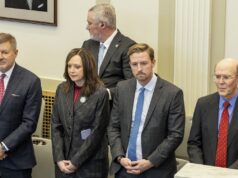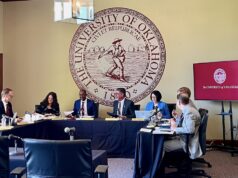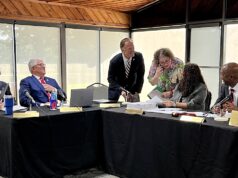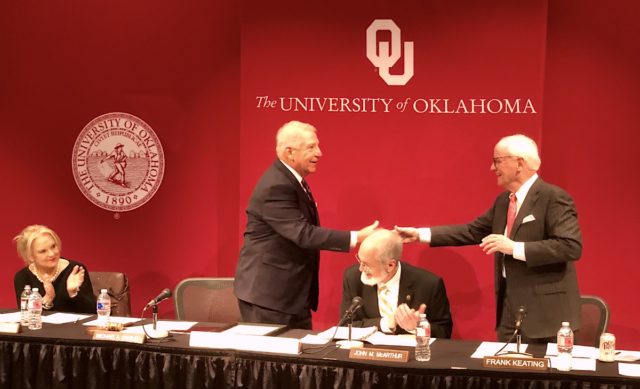

Today marked a changing of the guard for the University of Oklahoma Board of Regents.
In longtime board Secretary Chris Purcell’s final meeting, regents elected Frank Keating as their new chairman and Natalie Shirley as their new vice chairwoman. They bid farewell to Purcell and outgoing Chairman Michael Cawley, an attorney, businessman and “a super athlete,” according to regent Eric Stevenson, who said Cawley has pummeled him on the golf course.
Cameron University President John McArthur praised Cawley’s demeanor, which has made him a popular and respected regent among those who attend the board’s lengthy executive sessions.
“You do more with a good question than most of us do with a long speech,” McArthur said.
Cawley graced his peers with a brief soliloquy about the OU Board of Regents’ significant scope and what he views as an improved commitment to its obligation: to govern the administrations of the University of Oklahoma, Cameron University and Rogers State University.
“It has been a particular honor for me in joining this board of regents. I have been completely amazed by several things. One, I just did not know the breadth of scope of everything that goes on in this university. (…) There are a lot of moving parts,” Cawley said. “This board of regents is such a joy to work with. They all take their jobs seriously.”
Cawley offered an anecdote from when he served with an organization that hosted the OU Board of Regents’ annual summer retreat meetings. Cawley said he came away with the impression that some prior regents were perhaps too focused on golf and having a good time.
“I thought it was a country club kind of deal with great football tickets — getting on a plane and going to a bowl game,” Cawley said. “This job is really serious. It has really turned into a big-time, important job. [We have] really bright, considerate, energetic and serious-minded people [currently] serving the University of Oklahoma.”
Stitt: ‘What does that board need?’
Oklahoma Gov. Kevin Stitt is currently interviewing candidates who want the “serious job” of serving on the OU Board of Regents. Cawley was appointed in December 2019 after Renzi Stone resigned from the board, and his term concludes at the end of the month. In January, Phil Albert resigned from the board amid unanswered questions about embezzlement allegations he faces from his former employer.
That means Stitt is preparing to appoint two regents this spring.
“We’ve talked to Joe Harroz and the current people on the Board of Regents. What do they need? What are we managing? (…) What are the assets under management? A lot of it is the Health Sciences Center. Do we need someone with those types of experiences? Do I need a business person?” Stitt said. “There are a lot of things to think about, but I’m really just trying to give the board the skillsets and the acumen of what they’re looking for.”
Stitt noted the board’s governance of Cameron University, in Lawton, and Rogers State University, in Claremore. Albert previously worked for a Claremore-based company, and some in Rogers County may push for another regent to be appointed from the area.
Whomever Stitt taps for the two vacant OU Board of Regents positions, they will be supported by someone other than Chris Purcell for the first time in more than three decades.
“It has been such an honor to work with you, Chris. Our work has been made much easier because of your efforts,” Cawley said as the board presented her with a resolution and a pile of gifts.
Purcell said she has always joked that, upon retirement, she would like to set up a table on the North Oval and answer student questions about the Norman campus.
“It has been an honor to work with all of you. I never dreamed, I never planned on this happening to me,” Purcell said. “I was here. It just evolved. I loved the university and was teaching school, and I got a call to come back.”
OU President Joe Harroz said “everyone” loves Purcell, although he noted that his first interaction with Purcell proved awkward. At age 27, Harroz had joined President David Boren’s administration, and the board was meeting in Lawton. During a social gathering afterward, Harroz said people were ordering drinks, but Purcell brought him a non-alcoholic version owing to his youthful appearance at the time.
“All of us have been touched by you. Every time someone has had a moment in their life that is special, you have made sure that is recognized. And that touches lives,” Harroz said. “We will have that table set up for you on the North Oval.”
Harroz also announced the establishment of a new scholarship in Purcell’s name.
Fee increase approved for STEM students
Scholarships play a significant role in making higher education affordable for many students, especially as the cost of college has skyrocketed around the country. But in recent years, the OU Board of Regents has largely halted what had become annual increases to tuition and fees.
Wednesday, the board approved an overhaul to student fees, truncating the list from more than 700 to about 50, according to regent Anita Holloway. She said the “fee simplification” would not affect the overall amounts that students pay.
But regents also approved a new $40 special fee for STEM courses that will generate about $6 million for hiring and equipping more STEM faculty.
“Part of our discussion on these agenda items centered around the need to create a well-deserved raise program for our faculty and staff,” regent Anita Holloway said.
Noting that faculty and staff have historically faced long periods of time without salary increases, Holloway said the board wanted to “change this culture” where performance is not always rewarded.
“We are recommending that standards for performance-based raises be developed and brought to this board,” she said.
Harroz said “the message has been received” by the board to establish a regular raise program.
Rick Nagel, Stitt’s most recent appointee to the board, debated and voted against the STEM fee addition because he said legislative requests, fundraising and other options should be “completely wrung out and explored before we raise fees and tuition.”
For a student taking nine credit hours in a STEM field during any given semester, the fee would equate to $360 — a significant amount of money to many college students.
“The magnitude of this fee at $40 per credit hour does provide the university with a lot of resources. (…) We still kind of lack in my opinion some of the line-item type of institutional controls on the back end,” Nagel said. “We are making investments in things that we are still not really measuring, and I think that needs to be shored up. (…) I am hopeful the university will work more toward comprehensive proposals, particularly when tuition and fee increases are proposed. I view this sort of as a last resort.”
The measure passed 5-1.
Earlier in the day, Stitt said he hoped the OU Board of Regents would return to a commitment of keeping tuition flat after a slight increase was approved last year. Nagel also debated and voted against that tuition hike.
“It’s super important to me. And you can see that my appointee, Nagel, was wanting to keep it flat,” Stitt said. “My whole job is to protect Oklahomans. I want to give Oklahoma students a great education at an affordable price and graduate them with a job that they can step right into, and that’s why I think we need to work more closely with the business community to fill the jobs they need.”
‘We’re taking every single’ qualified nursing applicant
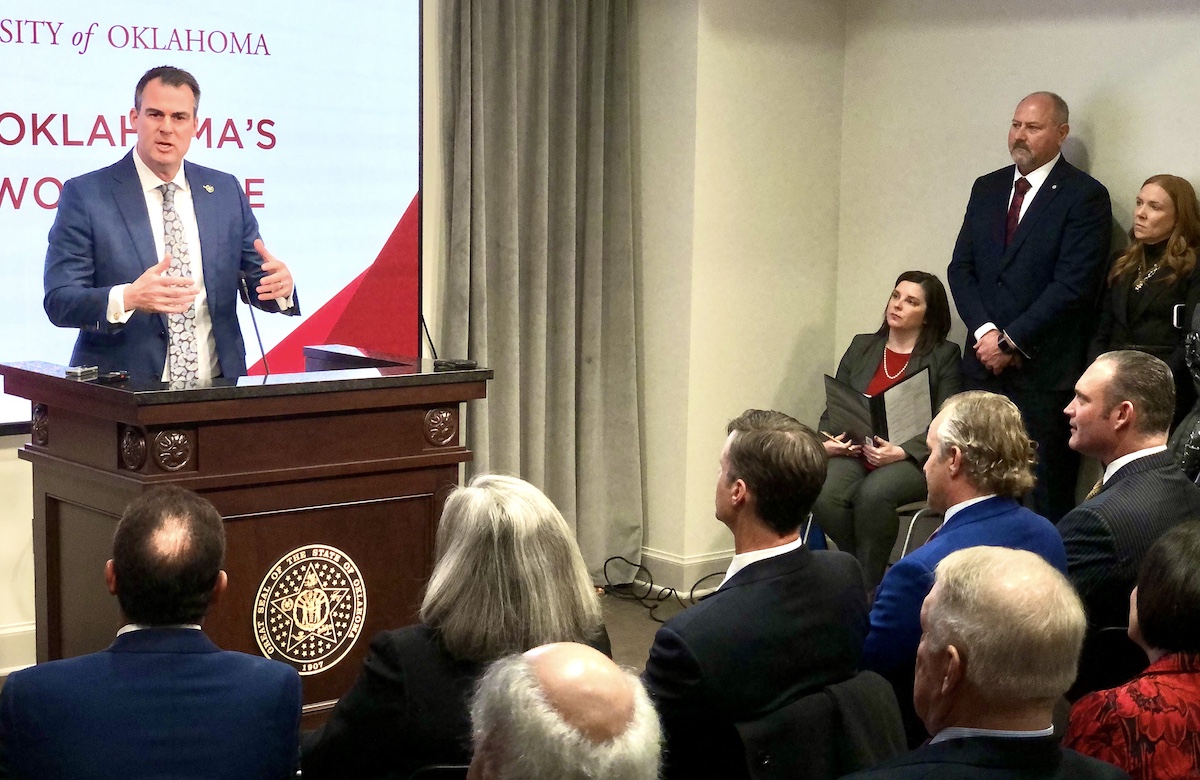
On Tuesday, Stitt joined OU and legislative leaders at the State Capitol to announce the expansion of the university’s nursing program capacity. Last year, the college admitted 362 people who applied, which Harroz said represented only 62 percent of qualified applicants.
This year, Harroz said 555 qualified people applied and, “We’re taking every single one of those 555.”
The next day, Stitt told NonDoc that he had been asking OU to find a way to increase its nursing student capacity as private employers — such as hospitals — have clamored for more bodies in the workforce.
“I’ve been pushing this for a while. Guys, why are we turning away qualified nursing applicants when we need nurses in our hospitals,” Stitt said. “So this year, 555 applicants, and they accepted 555 nursing applicants. Lo and behold. I kept saying, ‘Let’s put a couple extra desks in there. Why are we turning these (people) away?'”
Stitt said workforce issues, such as the need for more engineering graduates in the state, have been on his radar since taking office in 2019.
“When I talked to Boeing, for example, Boeing hires 50 engineers a month. We don’t even graduate that many in a year, so they have to hire these people from out of state,” Stitt said. “Let’s fill the needs that our companies are wanting here in this state. Nursing was just one example of that. I said it’s preposterous that we are turning away 50 percent of the people who want to pay, they want to be a nurse in Oklahoma, so let’s just go ahead and educate them here. That is a big, big win for us.”
OU College of Nursing Dean Julie Hoff said her college is starting a new nurse practitioner program for psychology and mental health treatment. Nurse practitioners are advanced practice, mid-level providers who operate under legal supervision of physicians. They can be key to ensuring health care access in rural and other underserved areas.
Rounding out the agenda
Other items of note approved by regents Wednesday include:
- Construction of a 10,000-square-foot radar assembly building near the Radar Innovations Laboratory on the Norman University Research Campus; (Agenda item 25)
- A $1.8 million purchase of an Elionix electron beam lithography system, which is dedicated to the nanofabrication of quantum devices; (Agenda item 26)
- A university housing policy adjustment expanding the requirement that freshmen live in OU dormitories to apply to all students under age 21 and who have fewer than 24 college credit hours accumulated between their high school graduation date and their first day of classes at OU; (Agenda item 28)
- Authorization for OU President Joe Harroz to participate in a retirement plan that allows “excess” contributions. The plan is currently used by “certain Athletic Department employees”; (Agenda item 31)
- A change in OU’s natural gas supplier from Symmetry Energy Solutions to Constellation Exelon. (Agenda item 50)
Regents also approved a 10-year extension of the OU Athletic Department’s broadcasting and marketing agreement with IMG/Learfield Communications, which will increase revenues to the university. From agenda item 30:
The agreed terms significantly increase the average annual compensation in guaranteed license fees and other financial consideration over that provided in the previous contract and over what is otherwise available in the market. The terms include a revenue share of 70 percent of annual gross revenues (AGR), compared to the previous average share of approximately 55 percent of the AGR. Additionally, the new terms include a minimum guaranteed payment of $16,050,000 annual average over the life of the contract extension; an increase above the previous annual average of $9,500,000. The new term total minimum contract value is $160,500,000. Included in these financial terms are upfront payments of $3,000,000 in each of the first two contract years.










